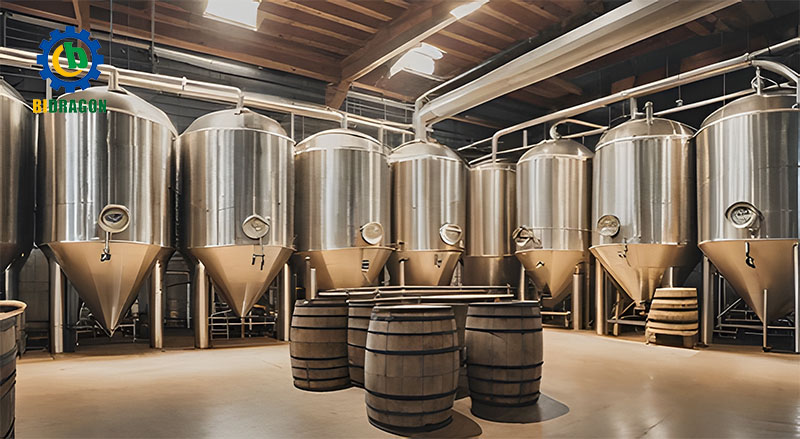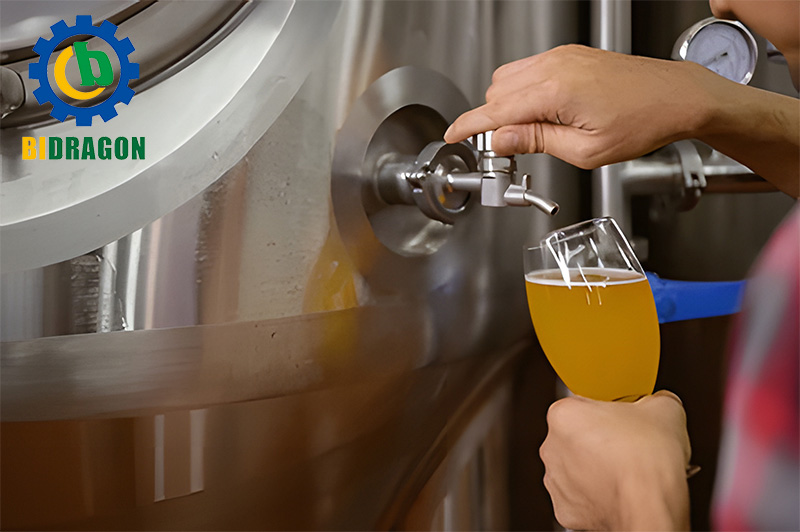Steam boilers play a crucial role in the distilling process. Whether it's heating the still, providing hot water, or sterilizing and disinfecting the equipment, a steam boiler is one of the core pieces of equipment that ensures the production of high-quality spirits. This article will detail the many applications of steam boilers in distilleries and provide practical advice on choosing the right steam boiler for a distillery.
The Role of Steam Boilers in Distilleries

Overview of the Distillation Process
Distillation is a complex process that requires precise temperature control. During distillation, the raw materials are heated to transform them into spirits, and steam boilers provide the heat needed for this process. Steam boilers help distillers control the temperature by generating steam, which ensures the quality of the alcohol and the safety of the production process.
Why Choose Steam?
Steam offers many unique advantages over other heating methods. Steam not only heats efficiently, but also provides uniform and controlled heat, which is critical for temperature control during the winemaking process. Steam boilers perform better in terms of temperature fluctuations and energy utilization than electric or direct flame heating.
How Steam Boilers Heat a Distillery

Heating a Distillery Kettle
A distillery kettle is the central piece of equipment used to heat and evaporate alcohol in the distilling process. Steam boilers help keep the temperature inside the kettle within an optimal range by providing high quality steam. Precise temperature control not only affects the efficiency of the brewing process, but also directly determines the taste and quality of the final alcohol product.
Hot Water Production
The brewing process requires a large amount of hot water, especially during the malt saccharification and fermentation stages, where the temperature of the water needs to be maintained within a specific range. Steam boilers provide stable temperature support by heating the water source to ensure that each production stage runs smoothly.
Steam boilers in disinfection and sterilization
In breweries, hygiene and cleanliness are essential requirements to ensure the quality and safety of alcohol. Steam boilers play a vital role in this process. Similar to the use of steam to sterilize surgical instruments in hospitals, distilleries also need to use steam to thoroughly disinfect and sterilize equipment. In this article, we'll explore in detail how steam boilers help breweries keep their equipment sanitized, prevent microbial contamination, and ensure the quality of each batch.
Sterilization of Steam
The high temperature of steam effectively kills bacteria, mold, yeast and other microorganisms, preventing them from growing in winemaking equipment. The winemaking process involves a variety of equipment and tools, such as fermentation vats, wine storage bottles, pipes, filters, etc. If these equipment are not thoroughly sterilized, they may become a breeding ground for bacteria or other contaminants, which in turn affects the quality and safety of the wine. Steam boilers, on the other hand, can quickly and completely eliminate these potential sources of contamination by generating high-temperature steam.
In practice, steam sterilization is usually required to reach temperatures of at least 85°C or higher, and higher temperatures may be required for certain equipment that specifically needs to be sterilized. High-temperature steam not only kills bacteria, but also effectively removes impurities, grease and deposits from the surface of the equipment, ensuring that it is clean and free of residues, thus avoiding any factors that might affect the quality of the alcohol.
Scope of Application in Sterilization Process
Sterilization of Fermentation Equipment: Fermentation is a crucial part of the brewing process, in which yeast converts sugar into alcohol. The presence of bacteria or molds in the fermentation vessel may interfere with the yeast fermentation process, resulting in failure of the fermentation or impaired flavor of the wine. With steam generated from a steam boiler, a brewery can effectively sanitize fermentation buckets, tanks, and other equipment to ensure that the yeast works smoothly in a clean environment.
Sterilizing bottles and kegs: Bottles, kegs and other wine containers are an essential part of the winemaking process. Using containers that are not well sanitized can lead to contamination of the wine during storage, affecting the flavor and aroma of the wine. Steam boilers provide high-temperature steam for these containers, ensuring that each container is thoroughly sterilized before use.
Cleaning of piping systems and filters: The piping systems and filters inside a brewery tend to accumulate sediments and microorganisms generated during the brewing process after long-term use, and these substances, if not cleaned in a timely manner, may affect the taste and quality of the wine. Steam boilers can provide continuous and stable steam to ensure that piping and filters are thoroughly sanitized to avoid microbial growth.
Sterilization of wine bottles and other packaging materials: Steam boilers also play a role in the filling and packaging of wine bottles. By treating bottles and packaging materials with high-temperature steam, the brewery not only ensures that the bottles are clean, but also prevents bacterial contamination. Especially in the production line for bottled or canned wine, it is vital to maintain the sterility of each packaging material.
Advantages of Steam Sterilization
Highly Effective Sterilization: Steam has an extremely high temperature and penetration capacity, which quickly kills a wide range of bacteria, molds and other microorganisms. Compared to chemical sterilizers, steam sterilization contains no harmful chemicals and leaves no residue, avoiding the potential impact of chemicals on the quality of alcohol.
Save time and labor: The process of steam sterilization is simple and efficient, steam can quickly penetrate the surface of the equipment and carry out deep sterilization, reducing the time and labor costs of manual cleaning and disinfection. For large breweries, the use of steam sterilization equipment can greatly improve production efficiency.
Environmentally Friendly: Steam sterilization is an environmentally friendly method of disinfection that produces no hazardous waste or chemical residue compared to the use of large quantities of chemical cleaners. With increasingly stringent environmental requirements, steam boiler sanitization has become a greener, more environmentally friendly option for breweries.
Preventing Cross-Contamination
Breweries typically involve multiple production stages, such as malt saccharification, fermentation, distillation, storage and packaging. Each of these processes can present a risk of cross-contamination. If equipment or tools in a particular process are not thoroughly sanitized, this may lead to the spread of microorganisms, affecting the quality of the wine from the entire production line. Steam boilers provide continuous high-temperature steam to ensure that equipment in each step of the process is thoroughly sanitized before each use, thus effectively preventing cross-contamination and ensuring that the taste and quality of each batch of wine is up to standard.
Keeping Equipment Contamination-Free After Sterilization
Sterilized equipment needs to remain sterile for a certain period of time to avoid re-contamination. The steam generated by the steam boiler ensures that there is no residue on the surface of the equipment, preventing moisture or microorganisms from adhering to the equipment after use. In a brewery, keeping the equipment clean and sterile is the key to a smooth brewing process.
Steam Boilers Ensure Temperature Stability and Consistency
The Role of Temperature Control in Fermentation and Saccharification
Temperature control is key in the brewing process. Steam boilers not only help to heat the malt and water, but also precisely regulate the temperature during fermentation and saccharification. This is crucial for yeast activity and the efficiency of alcoholic fermentation. Excessive temperature fluctuations can affect the quality of fermentation and may even lead to failure.
Ensuring consistent quality during the process
With a steam boiler, a brewery is able to maintain stable temperatures and avoid quality problems caused by temperature fluctuations. For example, steam can effectively heat the fermentation vessel to ensure the activity of the yeast during the fermentation process, thus helping to improve the taste and consistency of the final alcohol product.
Application of steam boilers in winery tasting and touring areas
Heating the tasting area
Wineries often have dedicated tasting areas for tourists and consumers to taste and purchase alcohol. During the cold season, it is important to keep the tasting area warm and comfortable. Steam boilers provide heat that not only ensures a consistent temperature in the winemaking area, but also keeps the visiting area warm, enhancing the customer experience.
Steam is used to regulate the air temperature
In addition, the steam boiler regulates the temperature in other areas of the winery, especially areas frequented by visitors. When touring a brewery, a comfortable ambient temperature enhances the visitor's experience and increases their identification with the brewery's products.
Impact of high quality steam on brewing quality
Impact of steam quality on alcohol quality
Steam quality is directly related to the quality of the alcohol product. Only clean, stable and continuous steam can ensure that the brewing process is not compromised. If the steam contains impurities, it may affect the temperature control during the brewing process, which in turn affects the taste and purity of the alcohol. Therefore, ensuring the clean and efficient operation of the steam boiler is a topic that every distillery must take seriously.
Applications in Distillation and Maturation
Steam does not only play a role in the fermentation and saccharification stages, it also plays an important role in the distillation and maturation of alcohol. The heat provided by steam helps to control the distillation temperature, ensuring accurate fractionation of the alcohol and ultimately the flavor of the spirit.
Factors to Consider When Selecting a Steam Boiler for Your Distillery
Start-up Time and Efficiency
Most small distilleries have flexible production schedules, so it's important to select a steam boiler that can start up quickly and run efficiently. Modern steam boilers are able to start producing steam in just a few minutes, avoiding long standby times that waste energy.
Boiler Size and Space Constraints
Breweries often have limited space, especially small and craft breweries. Therefore, it is important to choose a steam boiler that is compact and able to meet your production needs. Modern steam boilers are designed to be more compact, saving space without sacrificing efficiency.
Energy Efficiency and Environmental Protection
An efficient steam boiler can significantly reduce energy consumption and operating costs. Choosing a boiler with high energy efficiency and low fuel consumption can help a brewery reduce long-term operating costs. Modern boilers also have lower emission standards, helping breweries meet environmental requirements.
Maintenance and Long-Term Use
Steam boilers require regular maintenance and inspections to ensure they run efficiently for a long time. Choosing a boiler that is easy to maintain reduces breakdowns and downtime, thereby increasing productivity. Modern boilers are often designed with automated monitoring systems to help breweries identify potential problems.
Steam Boiler Maintenance and Troubleshooting
Regular Maintenance Prevents Downtime
Steam boilers are critical in brewery operations, so regular boiler inspections and maintenance are key to avoiding equipment failure. Common boiler problems include leaks, ignition failures, and dirt buildup, etc. Regular maintenance can help prevent these problems from occurring and ensure that production is not disrupted.
Chemical Treatment and Sewage
Water quality management in boilers is also very important, and regular sewage and chemical treatment can help reduce scale and corrosion. With proper water treatment measures, you can extend the life of your boiler and keep it running efficiently.
Conclusion
A steam boiler is a key piece of equipment in the production process of a brewery, providing a stable heat source, helping to control the temperature and ensuring the quality of the brew. Choosing a suitable steam boiler not only improves productivity, but also reduces long-term operating costs. Therefore, when selecting and maintaining a steam boiler in a brewery, factors such as the boiler's energy efficiency, size, start-up speed, maintenance requirements and environmental performance need to be considered.























